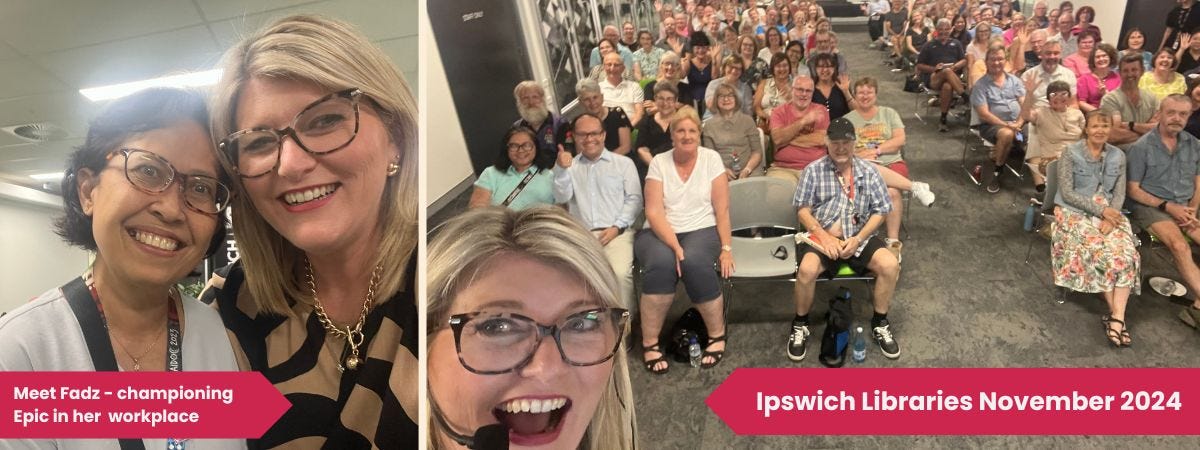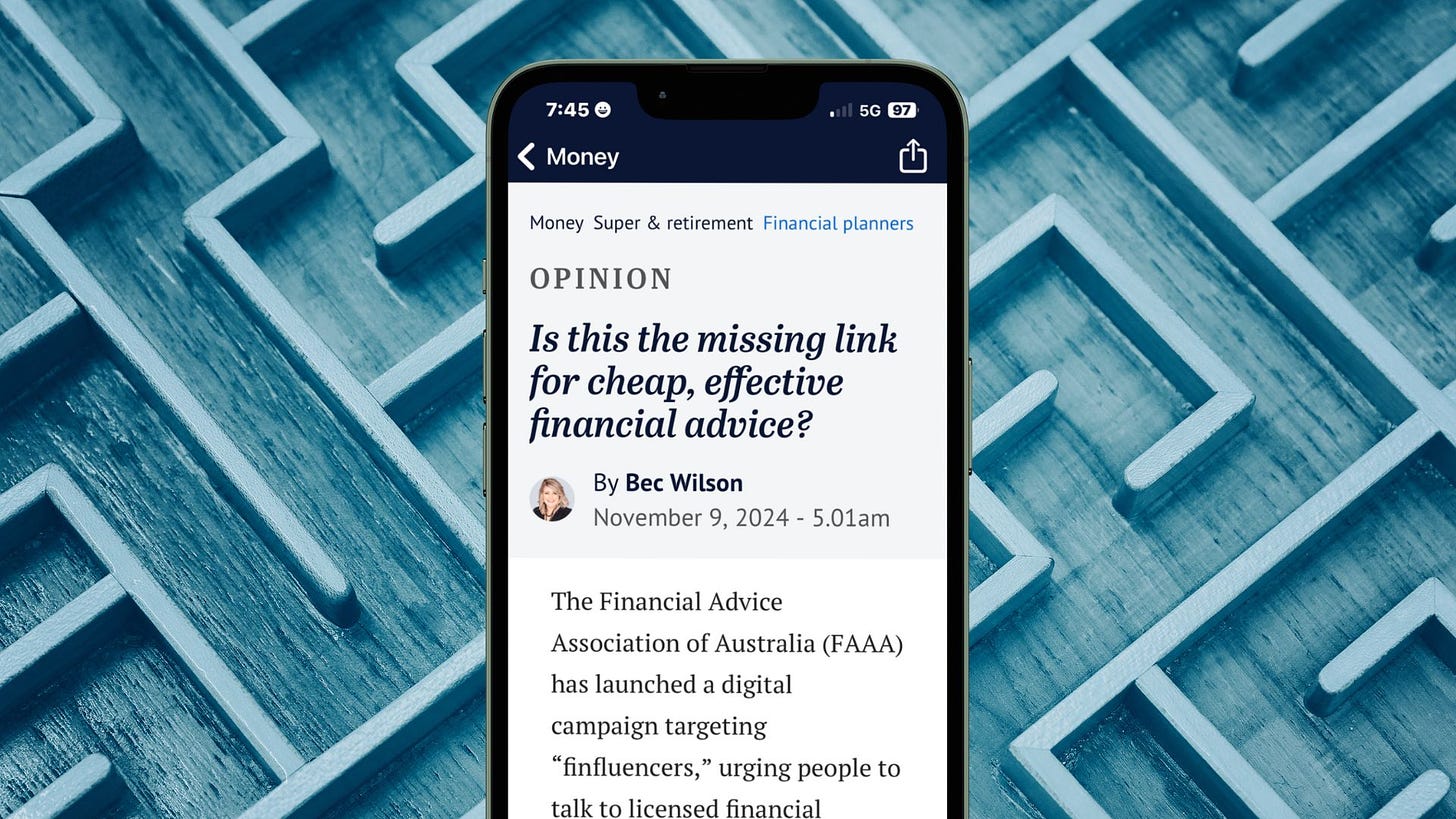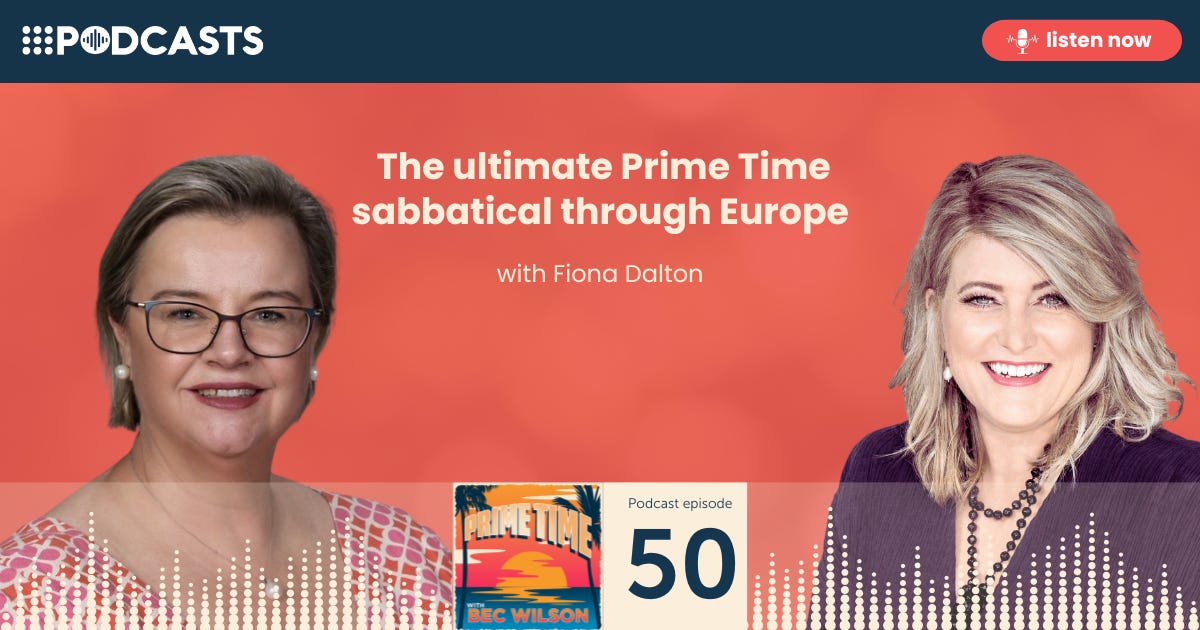Waiting for the pension to retire?
And in today's newspapers, 'Is this the missing link for cheap, effective financial advice? '?
In this edition
Feature: Waiting for the pension to retire?
From Bec’s Desk: Champions and questions
SMH/TheAge: Is this the missing link for cheap, effective financial advice?
Prime Time: The ultimate ‘Grown up Gap Year’ through Europe with Fiona Dalton
Waiting for the pension to retire?
Retiring with a little less doesn’t mean you can’t make your retirement feel truly epic. It’s not about wealth; it’s about understanding how the pieces fit together to give you ‘enough’ for a comfortable life. If you’re counting down to the pension age of 67, there are steps you can take right now to get ready and make the most of what’s possible. Today, I’ve got a roadmap to help you navigate toward a satisfying, layered approach to income that can create the freedom to live well.
Here’s how to layer your income, understand pension eligibility, and boost your super so you can feel confident about the future you’re building. And remember, it’s never too late to dream big and shape a retirement that feels genuinely fulfilling.
Grasp layering your income
As we move toward retirement we have to grasp a new way of thinking about income and cash flow. It can feel uncomfortable at first – and even uncertain but most people find the new way of living establishes itself in the first year or two. The simplest reality is we have to go from living on a single paycheck to living on multiple streams of income, some that have more certainty than others. Many people juggle a fortnightly income from the age pension, an income stream from superannuation, also usually paid fortnightly, and then they add to that other sources of income like working, and income from investments like rental properties or shares held outside super too. Understanding each of your income sources can help you have greater confidence in how to manage your costs to ensure you have ‘enough’. Let’s talk through those layers.
Understand your pension eligibility
About 50% of Australians in retirement today are dependent on the age pension as a critical source of retirement income, and 62% access a pension – so it is far from a dirty word. In fact, it’s a really impressive layer of income that can help you have enough to retire in comfort. Pension eligibility is calculated using two tests – the assets test and the income test. It’s worth doing a deep dive into both, years before you retire to get some perspective on whether you’ll be eligible for a part pension or a full pension. You are evaluated for the pension by the test you perform the worst in.
At a high level – the assets test – which is the test that more people are affected by at the moment, excludes the value of your family home. If you have assets of under $314,000 for singles and $470,000 for couples in total excluding your home, you’ll probably be eligible for a full pension from day 1 of your eligibility, so long as you don’t trip the income test. If you have assets of between $314,000 and $695,000 for a single person you’ll likely be eligible for a part age pension or between $470,000 and $1,045,500 for a couple. And if you qualify for even $1 of the age pension you can also get access to the pension concession card and commonwealth rent assistance - which can subsidie up to 40% of your rental cost if you are renting. If you have assets of more than $1,045,000 you may still end up entering the pension thresholds later in life, as you can reassess each year.
The income test is also important to understand and while it is more generous at the moment. It is calculated by adding together your ‘deemed income from financial assets’ a calculation you can do using the moneysmart website – effectively predicting how much the government will ‘deem’ your income to be from superannuation, shares, term deposits and other investments. You add your deemed income to the taxable income from rental properties and working (yes - lots of people in retirement still work). And you then calculate a fortnightly income amount. And, you need to allow for the ‘Work Bonus’ and the ‘Pension income free area’ – which can add up to $512 per fortnight for a single person before your pension is decreased from a full to a part pension or $972 for a couple, combined, taking in the work bonus and the income free area.
Why bother understanding the pension before you get there? Well this layer of income can be a great base-layer to plan around. When you know how much you can earn from the pension, it can then put into perspective how much super you need to draw each year to live comfortably.
If you have a lower than average super balance, and you’re waiting for the time when your pension kicks in, there a few things you can try to do to get ahead, or to start enjoying life while you work and wait for the big window of eligibility that hits when you turn 67.
Focus on paying off your mortgage or right-sizing your home
I’m sure I don’t need to reinforce this to anyone here – that you all recognise the benefits of paying down your mortgage before you retire. Living rent free for the rest of your life is an amazing thing, and quite probably the best thing you can do to have financial confidence in the years ahead. Honestly, putting investment returns aside, the personal peace and safety that comes from owning your own home as you enter retirement. And, by and large, most Australians are still managing it - with just 13% renting at the age of 65 in Australia today.
If your home is larger than you need or in a more fancy suburb than it needs to be, t’s worth considering how you could re-strategise the use of the money tied up in your home to have a better life as you plan for retirement. Smart downsizing choices might see you demolish any remaining debt, and be able to contribute to super using the Downsizing Concession – but be aware of how much value you want to hold in your home to manage your pension eligibility. There’s lots to think about here – your super fund can usually help you with some pension-friendly advice.
Boost your super contributions
While you wait - look for ways to contribute more to super. Superannuation can feel a long way off earlier in life, but once you can see retirement in the future there really is no better way to build up savings for your future.
One of the simplest ways to increase your retirement income is to add extra to your super. If you’re still working, consider salary sacrificing a portion of your income into superannuation, particularly trying to leverage the concessional contributions cap of $30,000 per year that goes in at just 15% tax. You can, if you come into a windfall contribute using non-concesional contributions of up to $120,000 per year and don’t forget the downsizer contribution – if you sell your principal place of residence that has been held for more than 10 years you can put up to $300,000 per person into super. Then, theres two other clever things to consider:
Catch-up contributions: If you’ve contributed less than the cap in previous years, you may be eligible to make catch-up contributions, which could be an effective way to give your super a last-minute boost.
Spouse contributions: If you have a partner with a higher super balance, they can contribute to your super account (and potentially receive a tax offset for it). This can help build up your balance while reducing the overall tax burden.
Of course, there’s more on all of this in the book.
Think about a transition to Retirement (TTR) Strategy
If you’re approaching pension age but not quite there yet, and you want to go part time and start tasting retirement early, you might be eligible for a Transition to Retirement (TTR) strategy. This allows you to access part of your super while continuing to work part-time or even full-time, giving you the flexibility to reduce working hours while supplementing your income. You can access a tax-free income stream from super from the age of 60. It’s capped at up to 10% of your balance, and you can’t draw out a lump sum.
Most people use a TTR to draw a small income to top up work income - but you could also use it to get smarter on tax – using TTR strategy to maintain your current lifestyle while sacrificing more of your regular income that would be paid at a higher tax rate into super up to your concessional cap of $30,000 per year, allowing your nest egg to grow. It’s not a big arbitrage, but it’s something.
Consider how your super is invested
It’s worth exploring how your super fund is invested in the run up to retirement, and whether it is invested in line with your true risk appetite.
And finally, thnk about your budget and lifestyle
If you’re going to be pension-dependent, planning a sustainable retirement budget is critical and the earlier in life, even before retirement, that you can make adjustments to your spending, the better. And I don’t just mean chopping out all the good bits of life. Take a realistic look at your current expenses, focus on ways to trim them where possible and try to build out a savings budget pre-retirement from the excesses and a discretionary budget for lifestyle that you understand more deeply, so you know what you can afford to do, and what you need to start saying ‘maybe not’ to.
And stay focussed on paying off your debt before you hit yoru r-day if you possibly can.
Learn about the sweet spot
If you’re dependent on the age pension, it’s really worth better understanding the sweet spot between the age pension and superannuation. I’ve written a much longer piece on it here.
Consider getting some financial advice
Finally, if you’re likely to be pension dependent, there’s plenty of places you can get affordable advice. Centrelink offers free appointments with a financial services officer to help you navigate age pension eligibility; and your superfund will almost always offer you financial advice that can help you contemplate how to invest your super, what you can and should draw down in retirement and how best to combine superannuation income with the age pension. You’re probably already paying for advice in your annual fee – so it’s worth using it.
And, if you have more assets to consider, or a more complex situation, tailored professional advice could be the key to maximising your income and discovering strategies you might not have considered.
Finally don’t forget to dream
Once you understand your financial situation, and how much income you will likely be able to generate from the various layers available to you, start dreaming about the things you can afford, the life you want to live — and start working towards it. Make it epic.
It’s amazing how fast 2024 has gone by. Just 6 weeks until Christmas, and it feels like everything is relaxing or maybe it’s just me, having that huge book deadline behind me.
This week, I’ve been focussed on a couple of big events and buzzy projects.
A huge thanks to Ipswich Libraries who hosted a very fun “evening with Bec Wilson’ this week - and to all of the 130 people who came along. I’m told they always expect a drop off to these events, but there simply wasn’t a spare seat in the room. It was packed to the brim. And that’s a real thrill as an author, speaker and educator in a world where people don’t always leave their homes for events anymore.
–-
Calling out for Epic Retirement Workplace Champions
While I was at the Ipswich Library, I met a lady called Fadz, who works there. And over the evening, all her team kept coming up to me saying “She’s your biggest champion… She’s always suggesting Epic Retirement ideas - and helping us feel inspired, and has the book and podcast constantly in conversation”.
It made me stop and realise that we have lots of other people like Fadz in our community, who are embracing the lessons for how to have an Epic Retirement so much they are telling others about them and guiding people through. And it made me want to bring together a new ‘special’ group of ‘Workplace and Community Champions’ for Epic Retirement. I want to know who you are - so I can say thank you, and tool you up with things to make spreading the lessons easier over time. So if you’re a workplace or community champion for having an Epic Retirement, please complete this form. I’ll look for ways to make you even better at it in 2025 and I’ll be in touch more personally to look for things to do! And I’ll find ways to say thanks too! I know there’s quite a few of you out there - and I’m really grateful!
Here’s a pic of Fadz – what a legend!
—
A huge request for epic stories - for the podcast and a special feature I’m doing
How to Have an Epic Retirement has been around for nearly 18 months now. So it seems like a great time to ask you for your epic success stories. We’re going to do a show on the Prime Time podcast to close out the year where we tell your stories and read your letters – so I’d love to hear from you. Would you write in and tell me how your Epic Retirement preparations and journeys are going – what you’ve discovered about yourself, money and the meaning of retirement. Share with me the transitions you’ve grappled with and the investments and changes to super you’ve made that built your confidence. Tell me about how your views on work have changed - and what you’re doing now for fulfilment. Share your healthy living lessons and tell me about your family and your travels – all the wonderful adventures you’ve had and the ones you have planned.
I’ll read the emails aloud on my podcast Prime Time – if you tell me I can. Please, send them to bec@epicretirement.com.au.
And, we’re going to start answering your questions weekly on the podcast - so send them in – it’s a new segment we’re going to start ASAP!
—
The Prime Time podcast just kicked a big goal
OMG - our little podcast Prime Time just roared through it’s 50th episode and its 300,000th download! Many many thanks to the HESTA team for sponsoring the podcast this quarter enabling us to do what we do! This week’s episode is an absolute ripper with Fiona Dalton – all about her recent ‘Prime Time European Sabbatical’. Have a listen!
—
Women in Super Christmas Party
If you’re in the retirement and superannuation industry I have one big event left this year - and that’s keynoting the Women in Super Sydney Christmas Lunch! What a gig! Hundreds of people have booked but there’s still a few spots and tables available. Here’s the link to book. Come along.
And that’s enough for one Sunday. Have a wonderful week. Make it epic
Many thanks! Bec Wilson
Author, podcast host, columnist, retirement educator, and guest speaker
Is this the missing link for cheap, effective financial advice?
Extract of article published in print in The Age, The Sydney Morning Herald, Brisbane Times, WA Today on Sunday 10th September 2024.
The Financial Advice Association of Australia (FAAA) has launched a digital campaign targeting “finfluencers,” urging people to talk to licensed financial advisers instead.
For those who can afford it and seek advice at the right times, I agree – quality advice can be invaluable. But here’s the reality: financial literacy is low for many Australians, and most people don’t even know if the advice they’re getting is truly suited to them.
Add to that the millions who simply can’t access affordable advice, and you’re left with people either trying to figure things out on their own or, worse, turning to influencer content that might not serve their best interests.
If we’re serious about building financial confidence in Australia, we need to look beyond pointing fingers at finfluencers. The real solution is self-help financial education – a nearly empty space where people can access unbiased, practical information without the sales pitch.
But here’s the catch: the financial advice industry isn’t set up to champion self-help education. A more financially literate public might not need advice as often, and that reality doesn’t drive revenue.
Instead of just criticising finfluencers, we should be learning from their approach – asking ourselves why people are turning to them in the first place.
Finfluencers pose a risk to everyone, but instead of just calling them out, maybe the financial advice industry could learn lessons from them
Let’s face it, most available financial education is dry, overly complex, or too disconnected from the real-life decisions people need to make. Why aren’t we investing in self-help financial education that’s engaging, accessible, and genuinely useful?
We need to fill the information gap with resources that empower Australians to make confident financial choices, not just create a bigger queue for advice services that are already unable to cope with the current levels of enquiry.
Imagine having programs and resources that people could turn to as life changes, helping them recognise when they need advice and when they don’t. Most people only need advice at pivotal times, not every year, and the industry can’t realistically serve everyone one-on-one.
Filling this gap with engaging education would mean equipping more Australians to make smarter decisions on their own terms, without relying on influencers who might not have their best interests at heart.
Just the other night, my 16-year-old son floored us at the dinner table. We were discussing how important homeownership can be for a secure retirement, and he suddenly said, “I’ll never be able to buy a house.”
We stared at him for a moment. “Of course you will!” we said, almost in unison. “You just need to understand how it works – get some reliable skills, a job you enjoy, and eventually save up for a deposit for a house you can afford – then the growth in value of your first house helps you gradually get a bigger house one day.”
But he was unmoved. “No, the message on TikTok is clear – I won’t ever be able to afford it.”
He’s not going to get financial advice until much later in life – does that mean he doesn’t deserve to learn? But where can he learn? His school doesn’t teach it, financial advisers don’t teach it, and mum and dad aren’t exactly ‘cool and current,’ in his eyes.
It’s not just TikTok. On Facebook, retirement finance groups are popping up everywhere. However, look a little closer, and transparency is lacking. These groups invite consumers to post their personal financial situations, sparking a flood of comments from members and ‘expert’ financial advisers – some of whom may be there purely for lead generation, possibly even paying for access to the community without disclosure. And the other commenters certainly aren’t qualified to offer advice.
How would consumers know? They’re left to sift through a confusing mix of opinions, unsure whom to trust. Many end up reaching out to one of these advisers lurking in the groups, which is concerning.
Read on, in The Age, The Sydney Morning Herald, Brisbane Times and WA Today.
The ultimate Prime Time sabbatical through Europe with Fiona Dalton
This week’s Prime Time is a real treat, with the fabulous travel guru, Fiona Dalton back on the podcast! You might remember Fiona from her last appearance, where she spilled all her insider travel tips. Well, she’s back to share something even juicier: her own grown-up gap year across Europe. Yep, Fiona took a massive sabbatical and travelled exactly the way she wanted, and she’s sharing every bit of her journey with us.
This show is an inspiration for anyone keen for a slow-travel European adventure. And, she did it solo — and keenly shares her lessons learnt.
LISTEN TO THIS EPISODE OF THE PODCAST HERE:
Last of all, if you haven’t read the book, you can order your copy from Amazon online and Big W online too. Or pick up a copy at your local Big W, or QBD stores.













